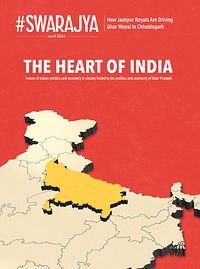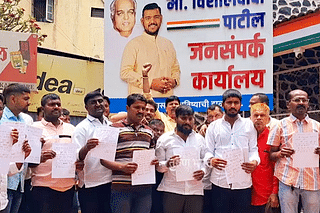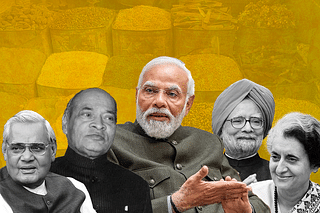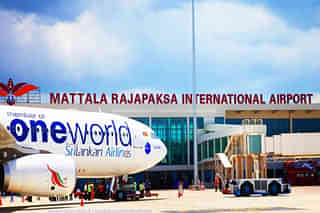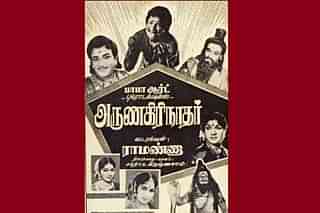Politics
West Bengal: Managing The Politics Of Illegalities
Pratim Ranjan Bose
Sep 16, 2022, 06:41 PM | Updated 06:41 PM IST
Save & read from anywhere!
Bookmark stories for easy access on any device or the Swarajya app.
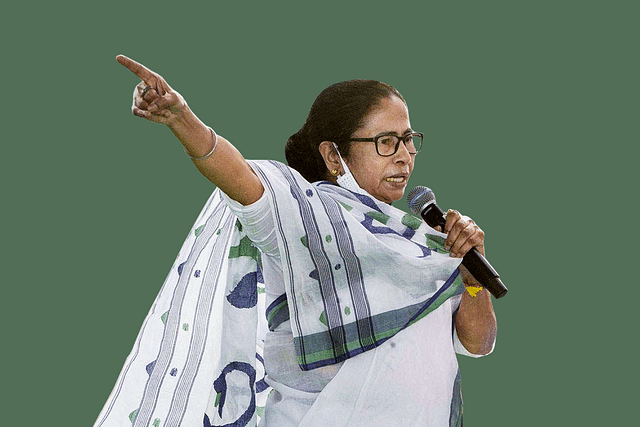
In a recent raid, the Enforcement Directorate (ED) unearthed a cash pile of over Rs 17 crore from the house of Aamir Khan, a little-known transporter-cum-mobile-game-fraudster, in Kolkata’s Garden Reach area.
He made quick riches in the last decade.
This is the second-most sensational seizure in the city after over Rs 50 crore cash haul from a failed film actress and close aide of the ruling Trinamool Congress’s then general secretary and the second most important minister, Partha Chatterjee, in July.
Before the ED could complete the seizure at Khan’s house, Firhad Hakim, city mayor, Urban Development Minister as well as local MLA, accused the federal government of conspiring against the business fraternity in the state.
A few other ministers also joined the chorus.
Hakim, although, changed his statement a day later.
The sharp reaction of the ruling party to an apparently non-political issue, took us to a puzzle concerning the development pattern of West Bengal that social and economic commentators have been trying to solve for a long time.
A decade ago, at the fag-end of the Left rule, a business school professor looked for answers behind the state’s poor finances. According to him, the state’s tax performance was a “statistical outlier.” (“West Bengal Government Finances: A Critical Look,” Debabrata Datta, EPW, 30 October 2010).
“Managing illegalities”
The article held that despite having a mid-level per capita income and high growth rate, West Bengal's finances fared poorly on most parameters.
Its tax-to-GSDP (gross state domestic product) ratio was the lowest and the revenue deficit was the highest among all general category states.
Alongside, the consumption-income ratio is also low and the savings-income ratio is not very high.
“This suggests the need for a fresh look at the state's true level of development as well as examining whether low tax collection is a result of its style of governance,” it added.
The writer explored all angles before landing up at some “peculiar features”.
Structurally, a major reason behind West Bengal’s low tax earnings was a sustained decline in the share of organised manufacturing since the 1970s and a parallel rise in unorganised activities.
From one of the most industrialised states in the 1960s, the share of manufacturing in West Bengal was down to 9.11 per cent of the gross state domestic product (GSDP) — nearly half the national average — in 2008-09. (“Manufacturing Sector in West Bengal,” The Journal of Industrial Statistics).
The CP(M)-led Jyoti Basu government (1977-2000) filled up the gap with a unique politics-sponsored rent-seeking economy.
“Left Front governments in WB have introduced an informal system of governance. Chatterjee (2009) terms this as “managing illegalities”,” said EPW.
Converting the city pavements into a marketplace ignoring the interests of large businesses and citizens; allowing unlicensed auto-rickshaws to ply compromising traffic safety; illegal sand mining and stone quarrying; illegal tolls and the famous ‘syndicate’-raj in construction became a norm.
Tax collections suffered. Economic operations were cartelised between groups and sub-groups making the effective costs unviable for law-abiding business activities, but the ruling politics found a new ‘income’ alternative.
No Change In Mamata Banerjee Rule
From bus owners to labour contractors no one had the right to employ. Trade unions became employment exchanges.
Daily fees were collected at every bus, taxi, auto-rickshaw and even rickshaw stand. Hawkers were allowed to destroy the look of a pricey hotel for a price tag.
Party, not the government, became the invisible owner of the land and life rallied around them. Their daily collections soared. Party offices became bigger and better.
Political spending kept rising, ignoring the slide in organised activities and the notional loss of donations thereof.
West Bengal became a breeding ground of fly-by-night operators who started taking the state to ransom when Mamata Banerjee’s Trinamool Congress was rising to power.
By 2010, Ponzi owners were dominating the state’s media space and were evidently supporting a ‘change’.
Looking back, the Buddhadeb Bhattacharjee government (2000-2011) did try to turn the wheel by attracting large-scale investments.
Banerjee rose to power at the destruction of those dreams. The growth momentum of the economy slowed down since.
According to Maitreesh Ghatak, a professor at the London School of Economics, West Bengal had been lagging behind the national economy in terms of per capita net state domestic product (constant prices) since 2005. The gap widened during 2012-20 as against 2000-2010.
The slowdown is dramatic in manufacturing and services.
Manufacturing GSDP grew at 7.1 per cent in West Bengal during 2000-10, marginally behind the national average of 7.4 per cent. During 2012-20, the state reported 6.6 per cent growth but the national average improved to 8.6 per cent.
Till 2010, West Bengal posted higher growth in services than the nation. The situation reversed in the last decade as the state posted 6.5 per cent growth vis-a-vis 7.7 per cent in India.
Undoubtedly, industrial decline gained momentum during 2012-2020.
However, there is little evidence that state politics became poorer. CPI(M) is now restricted to Kerala. It never had access to any industrialised state.
As of January 2022, the party stood fourth — after BJP, BSP and Congress — in terms of declared assets.
Trinamool Congress occupied the fifth slot in terms of declared assets.
In terms of the value of electoral bonds redeemed between 2017-18 and 2020-21, BJP, Congress, BJD (Odisha) and YSR Congress (Andhra Pradesh) are ahead of Trinamool. All have access to richer economies.
It's All About Politics
West Bengal is now reduced to a dole-dependent suboptimal agrarian economy.
The maximum agriculture wage in the state is Rs 250 a day (for men), which is a fraction of the wages in many western and southern states.
There are fewer legitimate options for the youth to fulfill their aspirations. This is the perfect setting for politics-backed illegalities to grow.
The scores of scams, enquiries, arrests and cash hauls strengthen the suspicion that the share of illegalities in the West Bengal economy has grown manifold.
The key concern is if politics anymore has control over it or, like the drug dealers in Brazil, the illegal economy has now started controlling the politics of West Bengal.
The second option will create a cycle of perpetual corruption and rent-seeking irrespective of the change of power.
Save & read from anywhere!
Bookmark stories for easy access on any device or the Swarajya app.
Introducing ElectionsHQ + 50 Ground Reports Project
The 2024 elections might seem easy to guess, but there are some important questions that shouldn't be missed.
Do freebies still sway voters? Do people prioritise infrastructure when voting? How will Punjab vote?
The answers to these questions provide great insights into where we, as a country, are headed in the years to come.
Swarajya is starting a project with an aim to do 50 solid ground stories and a smart commentary service on WhatsApp, a one-of-a-kind. We'd love your support during this election season.
Click below to contribute.
